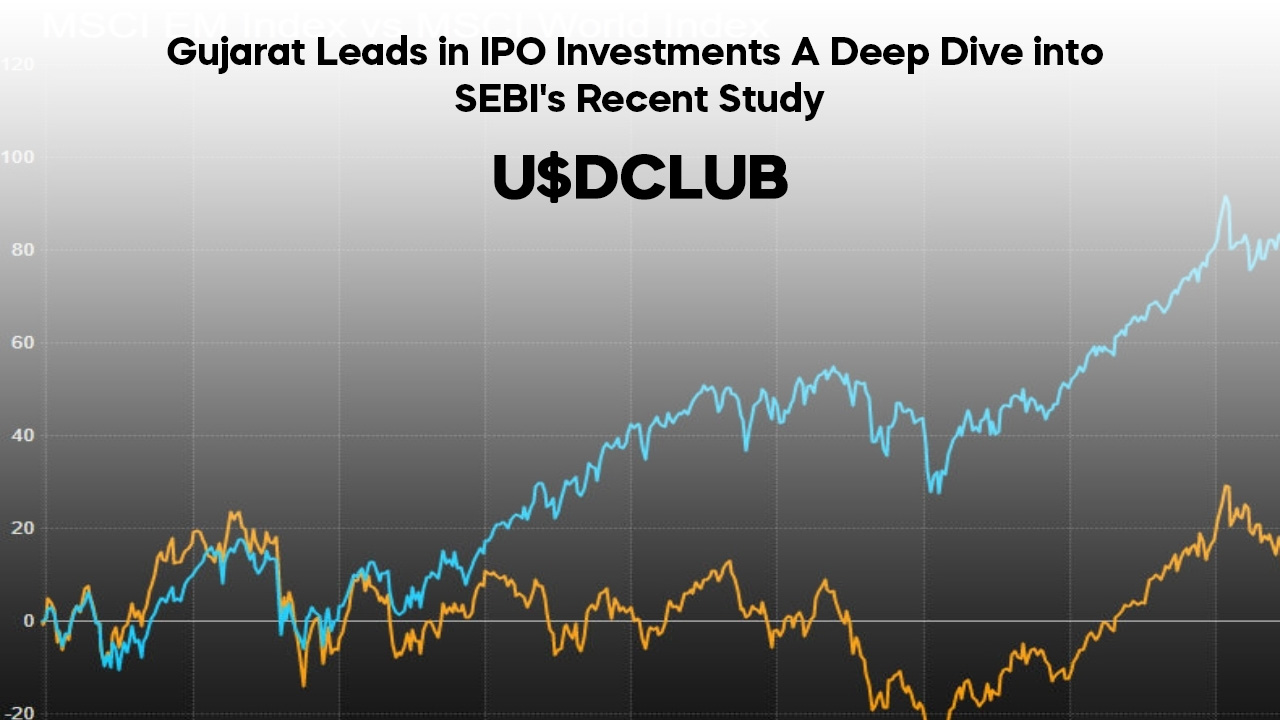The Indian stock market has experienced a significant surge in retail and institutional investor participation, and one state, in particular, has emerged as the clear frontrunner in IPO investments: *Gujarat. According to a recent study conducted by the **Securities and Exchange Board of India (SEBI)*, Gujarat leads the country in both retail and non-institutional investments in Initial Public Offerings (IPOs).
This report, which analyzed data from *144 IPOs* between April 2021 and December 2023, highlights the dominance of Gujarat’s investors in IPO participation. As we explore this phenomenon, it becomes essential to understand what factors drive this investment culture, why Gujarat stands out, and what this means for the broader Indian stock market.
Key Findings of the SEBI Study
SEBI’s study sheds light on some crucial insights into the IPO investment landscape across India. Let’s break down the numbers:
-
Gujarat’s Retail Investor Dominance
Gujarat leads the charge with *39.3%* of retail investors in the IPO market. This means that nearly 40 out of every 100 retail investors in the Indian IPO market are from Gujarat. This is a staggering statistic, considering Gujarat’s population is only around *5%* of the country’s total.
-
Maharashtra, Rajasthan, and Uttar Pradesh Lag Behind
While Gujarat sits at the top, *Maharashtra* ranks second but with a significantly lower percentage at *13.5%* of retail investors. *Rajasthan* follows with *10.5%, and **Uttar Pradesh* comes in at *5.6%*. These figures reflect the varied levels of retail investor participation across different states.
-
Non-Institutional Investors
Gujarat is also leading in non-institutional investments, accounting for *42.3%* of non-institutional investors participating in IPOs. Non-institutional investors, often referred to as high-net-worth individuals (HNIs), play a critical role in driving IPO demand, especially for larger offerings. The dominance of Gujarat’s HNIs demonstrates the state’s investment prowess across the board.
-
Quick Profit Booking
The study also uncovered that *54%* of IPO shares are sold within *a week* of listing. This indicates a significant portion of investors seek to book quick profits rather than holding onto shares for long-term gains. It reflects a prevalent trading strategy where retail and HNI investors capitalize on short-term price gains during the initial volatility post-listing.
-
Limited Selling During Losses
Interestingly, when IPO stocks perform poorly or show losses, only *23.3%* of the shares are sold within the first week. This behavior reflects that investors are more willing to hold onto shares during a downturn, possibly waiting for prices to recover before making any exit decisions.
Why Gujarat is Leading in IPO Investments
Gujarat’s strong participation in the IPO market is not a sudden development but rather the result of several interrelated factors. Let’s explore why Gujarat has emerged as the top state for IPO investments.
-
Investment Culture in Gujarat
Historically, Gujarat has been known for its entrepreneurial spirit and business-oriented mindset. Cities like *Ahmedabad, **Surat, and **Rajkot* have a long tradition of trading and investment activities. Many Gujaratis have been active participants in the stock market for decades, and this familiarity with equities has extended to IPOs.
-
Higher Financial Literacy
Gujarat has relatively higher levels of *financial literacy* and awareness compared to other states. This means that retail investors in Gujarat are more informed about financial instruments, risk management, and investment strategies, which likely contributes to their high participation rates in IPOs.
-
Thriving Business Community
Gujarat is home to a thriving business community that includes *small and medium enterprises (SMEs)*, traders, and industrialists. These individuals have significant disposable income and are often looking for high-return investments like IPOs. Many businesses in Gujarat have themselves gone public, further encouraging local participation in IPOs.
-
Strong Network of Financial Advisors
The state has a robust network of stockbrokers, financial planners, and investment advisors who actively engage with retail and non-institutional investors. This ecosystem helps guide investors toward new IPO opportunities and provides them with the necessary tools and knowledge to invest wisely.
-
Proximity to Financial Hubs
Gujarat’s proximity to *Mumbai*, the financial capital of India, also plays a role in its investment dominance. Investors in Gujarat can easily access stock market resources and stay updated on the latest IPO trends.
The Broader Implications for the Indian Stock Market
The dominance of Gujarat in IPO investments is not just a regional phenomenon—it has significant implications for the Indian stock market as a whole. Here’s why:
-
Increased IPO Demand
With *39.3%* of retail IPO investors and *42.3%* of non-institutional investors hailing from Gujarat, companies planning IPOs will likely focus their marketing and outreach efforts on the state. This demand could lead to more IPOs being oversubscribed, pushing up initial share prices and creating favorable conditions for both investors and companies.
-
Liquidity and Price Volatility
The trend of *selling 54% of IPO shares within the first week* contributes to increased *market liquidity*, but it also leads to higher price volatility. Investors seeking quick gains often create fluctuations in share prices immediately after listing, a trend that can affect both seasoned and new investors.
-
Retail Investor Confidence
The participation of retail investors, especially from Gujarat, reflects growing confidence in the stock market as a wealth-building tool. The shift from traditional investment vehicles like *fixed deposits and gold* to equity investments shows that more Indians are willing to take calculated risks in search of higher returns.
-
Investor Behavior and Holding Patterns
The SEBI study’s finding that *only 23.3%* of shares are sold during losses suggests a trend of *holding onto stocks* in the hope of a recovery. This contrasts with the rapid profit booking seen when shares rise post-listing, indicating a difference in investor behavior when faced with losses.
The Challenges of a Rapidly Growing IPO Market
While Gujarat’s dominance in IPO participation signals strong retail and HNI investor engagement, there are also challenges that come with rapid growth in IPO activity:
-
Overvaluation and Market Bubbles
A surge in IPO demand can sometimes lead to *overvaluation* of companies, where shares are priced higher than their intrinsic value. This creates the risk of a market bubble, where companies may fail to deliver the promised growth, leading to a sharp drop in stock prices post-IPO.
-
Profit Booking and Speculation
The trend of investors selling more than half of their shares within the first week of listing highlights a *short-term, speculative mindset*. While this can drive up IPO prices initially, it may discourage long-term investment in fundamentally strong companies.
-
Access for Smaller States
While Gujarat and Maharashtra dominate the IPO scene, states like *Uttar Pradesh* and *Rajasthan* still have relatively low participation rates. There is a need to promote financial literacy and market access in these regions to ensure a more balanced distribution of retail investors across India.
Conclusion: Gujarat’s Role in Shaping India’s IPO Landscape
Gujarat’s position as the leading state for IPO investments highlights the state’s deep-rooted investment culture, financial literacy, and entrepreneurial spirit. Its dominance in both retail and non-institutional IPO participation has a profound impact on the broader Indian stock market, driving demand, liquidity, and market dynamics.
As India continues to see a surge in IPO activity, particularly from tech startups and established businesses alike, Gujarat’s investors will likely remain a crucial part of the investment ecosystem. However, to sustain this growth and ensure long-term market health, there needs to be a balance between short-term speculation and long-term value investment, as well as a focus on improving access for retail investors across all states.
For more such informative content and regular updates on stock markets, IPOs, and investment insights, stay tuned to *USDCLUB.US*.







